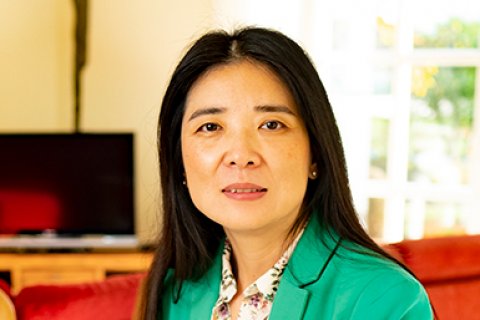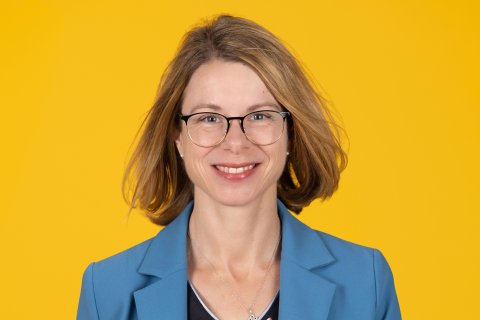“We must join forces to increase children's development opportunities”
A conversation with the chairs of the Early Childhood community of Dynamics of Youth

The first years of your life are the most important time of your life in terms of development. It is a time in which the brain is highly flexible and much is set in place for the years after that. That is why collaborating in research into the age range from before birth to six years old is incredibly valuable. Neonatologist Jeroen Dudink, linguist Aoju Chen and pedagogue Pauline Slot agree on this. They are the three community presidents who work with post-doctoral researcher Eline de Groot on the build-up of the Early Childhood community, which is covered under the strategic theme Dynamics of Youth of Utrecht University.
Three disciplines unite

Jeroen Dudink works as a paediatrician and a neonatologist at UMC Utrecht, where he works with children who were born prematurely or have difficult starts for other reasons. “Besides children who were born prematurely, I work with children who are vulnerable for other reasons: they were carried to term, but have had conditions like a shortage of oxygen at birth, a brain haemorrhage or a serious infection. At the Neonatology ward, researchers have been collaborating with linguists for some time and that collaboration takes of rapidly within this community.”
Because language development starts early on, even before a baby is born, linguist Aoju Chen explains: “I started looking into language development in children in their early primary-school age, but along the way, I moved my focus to more and more earlier stages of language development. That development starts in the womb: babies already start observing and processing their mothers' speech from 26 weeks onwards. But how foetuses experience this development has to be investigated further.”
Not just parents influence their children's development, but ALL places outside the family where children play and are cared for are important, pedagogue Pauline Slot observes. “Think about daycare centres and preschool, but also game mornings children attend with their parents.” Pauline investigates how children's development opportunities in these environments can be improved.
Intersections between research disciplines are an enrichment

There is much overlap between the community presidents' research fields, even though their daily work looks completely different sometimes. Aoju Chen has much use for her colleagues' insights in her research: “I think children's development is very broad in the first years. Language is an aspect of that and is often researched separately, while there are so many intersections with other fields. That's why joining forces as researchers is so important.”
Jeroen Dudink agrees with that: “We all have attention in our own ways for what's going on in children's early lives and how that influences their development. The research we do is about children's typical, but also atypical development. For instance, we also investigate children with vulnerabilities, such as premature birth, brain damage or congenital disabilities, but also in the societal field. We have good conversations about the impact these conditions have on their development.”
As a post-doctoral researcher, Eline de Groot helps to build up the community of Early Childhood. Her work for Early Childhood has also broadened her view. “I did my PhD research in the hospital and that's kind of a bubble. Now, I have the possibility to step out of that. To me, that comes with the realisation that the children I see in the hospital will be going home soon. We can do our best in the hospital, but we also have to think well on that transition to home. I think this community gives me context that helps in this.”
Social issues and the role of academic research

The research the community presidents do touches on social issues. Pauline Slot says: “For instance, there is a lot going on in daycare centres at the moment. The interests are big and sometimes at opposite ends. You then have to weigh your options as a researcher: for instance, how you can present knowledge and information that emphasises the importance of child development to policy makers as well as possible.”
Aoju Chen recognises that in her research field: “The influence of language skills on well-being is big, but I don't see it reflected often that policy makers see that interest and allot sufficient resources to it. Even though the quality of healthcare, daycare centres and education rises by moving the focus more to language development, that's what I'm convinced of.”
One aspect mentioned not often enough according to Jeroen Dudink is sleep. “I notice that sleep still receives far too little attention in research. You sleep as a child to grow and develop, and to recover. That requires much more sleep and a much more different form of sleep than an adult. I see there's still far too little attention for that in the hospital, but also in child-healthcare centres, rehabilitation centres and in daycare centres. And that then fits into our plea of ‘look at all aspects of development and don't overfocus on one of them.”
Research much too important to NOT share

The social relevance of the research is important at Dynamics of Youth. Because as Jeroen puts it: “What we research is too important to NOT share. And we would also like to collect ongoing questions within societies and collaborate to do research that has impact. These questions can come from parents, but also from daycare centres or policy makers. Anyway, we must join forces to increase children's development opportunities.”
Pauline Slot also emphasises that the collaboration as researchers is one thing, but a shared responsibility for the youngest children is also important far outside the university. “I think it's important that we all feel responsible for raising a new generation. There are often more adults than just the parents who can play a role in children's development. That's why it's important to look at all these different contexts.
I think it's important that we all feel responsible for raising a new generation. There are often more adults than just the parents who can play a role in children's development.
Insights in young children's development provide hope
Jeroen Dudink adds to this: “The good news is that exactly in that early age, there is so much to do and you can also make so much right. I call it the ‘Play-Doh period’, in which so much is still possible in development because the brain is still very plastic (malleable). For instance with attention for language and playing with your child. But also by putting more of a focus on the importance of sleep. We see that children with less of a good start can still have good opportunities. Exactly because there is still so much room for improvement.”

